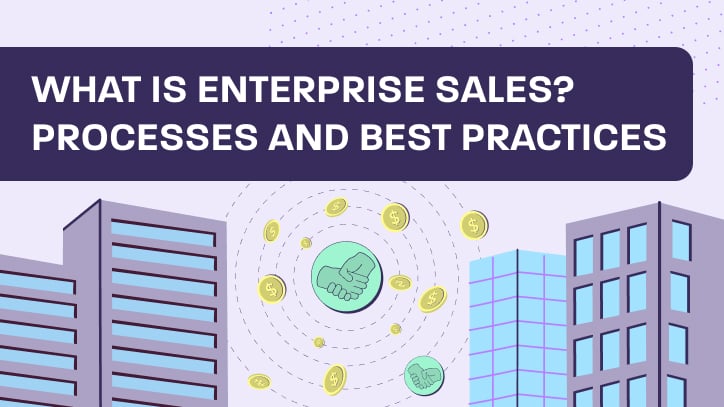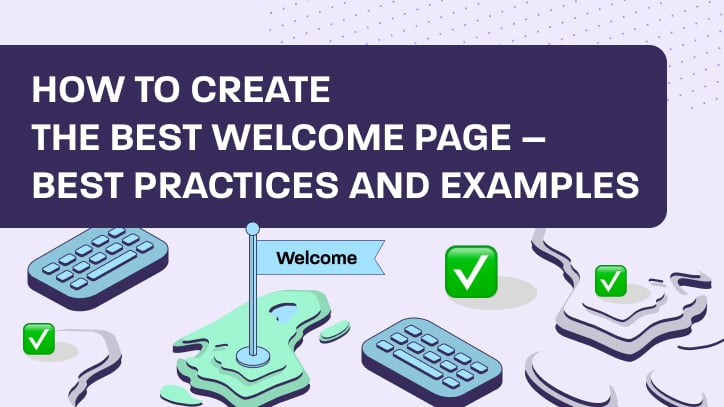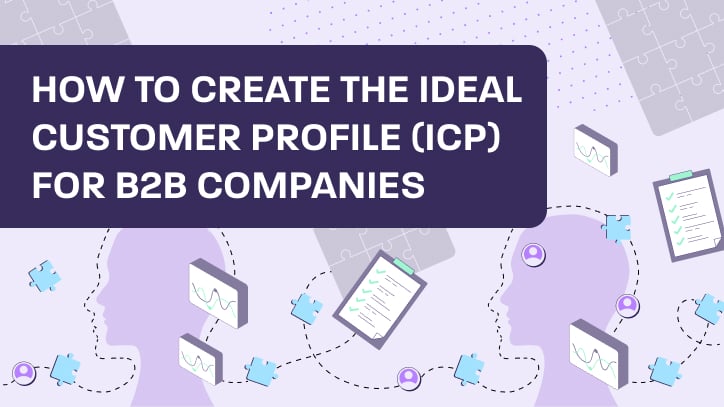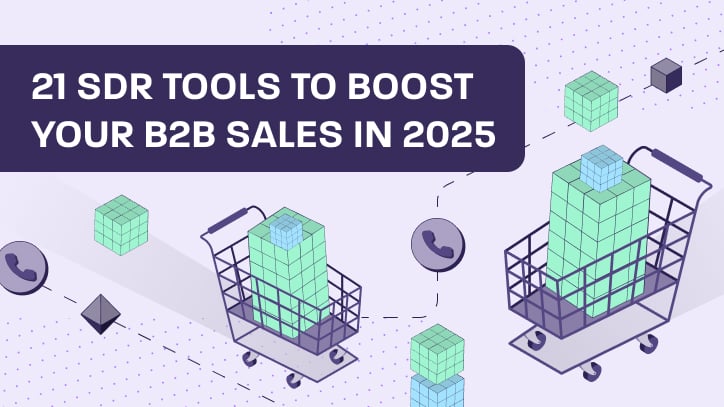Enterprise sales is the high-stakes, high-reward arena of B2B selling.
Unlike transactional sales models where a single decision-maker can approve a purchase, enterprise sales involves complex negotiations with multiple stakeholders, lengthy sales cycles, and high-value contracts that can make or break a company’s growth trajectory.
This sales strategy targets large organizations that require tailored solutions, extensive onboarding, and long-term relationship management.
For companies looking to scale and establish credibility in competitive markets, mastering enterprise sales is essential. Landing enterprise clients not only brings in significant revenue but also enhances brand recognition and opens doors to future opportunities.
However, the path to securing these deals is anything but straightforward. It requires a deep understanding of enterprise buyers, a strategic approach to stakeholder engagement, and a meticulous sales process that accounts for every layer of decision-making.
Now let’s go over what enterprise sales entails, how it differs from other sales models, and best practices for navigating its complexities!
What is enterprise sales?
Enterprise sales, often referred to as “complex sales,” is the practice of selling high-value products or services to large-scale organizations.
These companies are typically defined by their number of employees (often 1,000+), annual revenue, or global market presence. Some enterprises are publicly traded or rank on lists like Forbes or Crunchbase, reinforcing their significant industry influence.
What sets enterprise sales apart is the intricate nature of the sales cycle. Unlike SMB or self-service sales, enterprise deals involve:
- Multiple stakeholders – Decisions are made by buying committees, often including executives, department heads, finance teams, and IT specialists.
- Longer sales cycles – Deals can take months or even years to close, requiring ongoing engagement and strategic follow-ups.
- Customized solutions – Enterprises rarely buy off-the-shelf products; they expect tailored integrations and services that align with their infrastructure.
- Complex negotiations – Sales reps must navigate RFPs (Requests for Proposals), legal reviews, and extensive contract discussions before securing a deal.
Due to these factors, enterprise sales demands a consultative selling approach where reps function more as strategic advisors than simple product pitchers. Success in this space hinges on relationship-building, understanding customer pain points, and delivering value that aligns with the enterprise’s long-term objectives.
How enterprise sales is different from other sales models
Enterprise sales isn’t a one-size-fits-all approach. It differs significantly from other sales models like self-service and SMB sales, each of which has its own structure, cycle, and level of complexity.
Let’s break down the key distinctions.
Self-service sales vs. enterprise sales
Self-service sales operate on automation and scalability. This model is ideal for businesses offering low-cost products that customers can purchase independently via an online platform. Customers research, sign up, and buy with little to no human interaction, relying on FAQs, chatbots, and automated support.
Example: SaaS companies like Dropbox or Slack offer self-service options where users can subscribe, upgrade, and manage accounts without ever speaking to a sales rep.
Enterprise sales, by contrast, is highly personalized. Because large companies have unique needs, they expect customized solutions and direct engagement with sales teams. This model relies on relationship-building and strategic selling, rather than automation.
SMB sales vs. enterprise sales
Small and medium-sized businesses (SMBs) have simpler sales processes compared to enterprises. Their sales cycles are shorter, as they often involve a single decision-maker or a small team. They prioritize quick solutions over long-term customization.
Example: A startup purchasing a project management tool like Trello will likely buy based on immediate needs and budget constraints, rather than requiring extensive customization.
Enterprise sales, however, involves multiple approval layers, in-depth security reviews, and a long-term commitment from both parties. A contract with an enterprise often involves a dedicated customer success team, implementation support, and ongoing account management to ensure adoption and growth.
Mid-market vs. enterprise sales
Mid-market sales sit between SMB and enterprise sales. These deals are larger than SMB transactions but don’t require the same level of customization as enterprise deals. Mid-market companies typically have larger budgets and more stakeholders than SMBs, but they aren’t as bureaucratic as enterprises.
Example: A mid-sized company adopting a CRM like HubSpot may require limited customizations and a moderate onboarding process but won’t need a fully tailored implementation with dedicated account teams.
Enterprise deals, on the other hand, demand highly specific solutions, often involving integration with existing IT infrastructure, compliance approvals, and a more hands-on sales approach.
The complexity of enterprise sales means traditional sales tactics don’t always work. Companies pursuing enterprise clients must focus on:
- Stakeholder management – Mapping out key decision-makers and addressing the concerns of each department involved in the buying process.
- Tailored presentations – Crafting highly customized demos that showcase how the product or service solves the enterprise’s specific challenges.
- Long-term relationship-building – Establishing trust and credibility over months (or years) to ensure deal progression and future expansion opportunities.
Mastering enterprise sales is no small feat, but for businesses ready to scale, it’s the gateway to industry dominance, long-term growth, and sustained revenue.
Why is enterprise sales so important?
Enterprise sales isn’t just another sales strategy—it’s a powerful growth engine for businesses looking to establish themselves as industry leaders.
Unlike SMB or mid-market sales, enterprise deals bring in higher revenue, increase brand credibility, and position companies as trusted thought leaders in their respective fields.
More importantly, they foster long-term partnerships that drive sustainable business growth.
Here’s why investing in enterprise sales can be a game-changer.
Higher revenue
Enterprise sales deals involve significantly larger contracts than SMB or self-service sales. Instead of closing multiple small deals to reach revenue targets, a single enterprise deal can contribute millions in annual recurring revenue (ARR).
- Example: A SaaS company selling cybersecurity software may spend months securing a contract with a Fortune 500 company. However, once the deal closes, the enterprise client may commit to a multi-year contract worth millions, compared to SMB clients who pay only a few hundred dollars per month.
- Upsell and cross-sell opportunities: Enterprise clients often require additional features, integrations, and premium support, providing ongoing revenue beyond the initial deal.
For companies looking to scale efficiently, focusing on enterprise sales allows them to hit revenue goals faster with fewer deals.
Enhanced brand awareness
Landing an enterprise client isn’t just about revenue—it also enhances brand credibility. Large corporations conduct rigorous vendor evaluations, and securing their business signals market validation.
- Example: If a SaaS company wins a deal with a global bank, other financial institutions are more likely to trust their software. Enterprise clients serve as proof that the solution meets high industry standards.
- Visibility in the market: Featuring enterprise client logos on marketing materials, websites, and case studies builds trust with future prospects.
- Competitive differentiation: When a company successfully sells to enterprise clients, it separates itself from competitors who primarily target SMBs.
Securing enterprise deals creates a halo effect, making it easier to win future business in the same sector.
Thought leadership
Enterprise sales isn’t just about selling a product—it’s about solving complex business challenges. Companies that successfully navigate enterprise deals position themselves as industry thought leaders.
- Deep industry knowledge: Enterprise sales teams must understand industry-specific pain points, regulations, and technological requirements, demonstrating expertise in their field.
- Educational content: Companies that engage in enterprise sales often publish whitepapers, research reports, and case studies to educate potential clients, further establishing authority.
- Speaking opportunities: Securing enterprise clients can open doors to business panels, industry events, and partnerships, where companies can showcase their expertise.
Becoming a recognized thought leader in an industry attracts even more enterprise clients, creating a cycle of growth and influence.
Long-term relationships
Unlike transactional sales, enterprise deals prioritize long-term partnerships over one-time purchases. These relationships lead to:
- Higher customer retention: Enterprise clients often renew contracts and expand their usage over time, creating predictable revenue streams.
- Referrals and network expansion: Satisfied enterprise customers can introduce new business opportunities through their industry connections.
- Continued innovation: Close relationships with enterprise clients provide valuable feedback, helping businesses refine and improve their products.
For companies aiming for sustainable growth, enterprise sales ensures long-term stability and recurring revenue, reducing dependency on constantly acquiring new customers.
Enterprise sales requires patience, strategy, and expertise, but the rewards are worth it. From higher revenue and brand credibility to thought leadership and lasting client relationships, an enterprise sales strategy can transform a company’s growth trajectory.
Businesses willing to invest in long-term engagement, tailored solutions, and strategic selling will unlock exponential opportunities in the enterprise space.
The four stages of enterprise sales management
Enterprise sales is a structured and strategic process that unfolds over four key stages. Each stage plays a crucial role in ensuring that the solution aligns with the client’s needs, the sales team builds credibility, and the deal progresses smoothly.
These stages—discovery, diagnosis, design, and delivery—form the foundation of enterprise sales management.
Text for infographic:
Discovery – Research prospects, identify pain points, map stakeholders.
Diagnosis – Analyze challenges, define solutions, align with internal teams.
Design – Customize solutions, demo tailored features, address security needs.
Delivery – Implement, train teams, provide ongoing support, track ROI.
Discovery: Identifying opportunities
The first stage of enterprise sales is all about research and information gathering.
Sales teams work to understand the prospect’s business model, pain points, competitive landscape, and internal decision-making structure.
Key activities:
- Conducting in-depth research on the prospect’s industry, challenges, and objectives.
- Engaging in initial conversations to uncover needs and pain points.
- Mapping out key stakeholders and decision-makers.
Without a thorough discovery phase, sales reps risk misalignment between their solution and the client’s actual needs, which can lead to stalled deals or outright rejection.
Diagnosis: Defining the problem and solution
Once the discovery phase is complete, the focus shifts to diagnosing the specific issues the prospect faces.
This is where sales teams collaborate internally to analyze the prospect’s situation and determine the best approach.
Key activities:
- Analyzing pain points and prioritizing the most pressing challenges.
- Collaborating with technical, product, and customer success teams to develop viable solutions.
- Discussing potential roadblocks and setting expectations with the client.
Proper diagnosis ensures that the solution is tailored to the enterprise’s unique requirements rather than offering a generic, one-size-fits-all approach.
Design: Customizing the solution
Enterprise clients expect tailored solutions that integrate seamlessly with their existing infrastructure.
In this stage, sales teams work closely with the client to fine-tune the proposal, ensuring all technical, security, and operational needs are addressed.
Key activities:
- Developing a customized proposal with specific features, integrations, and support structures.
- Conducting product demonstrations that highlight relevant functionalities.
- Addressing compliance, security, and IT concerns with detailed documentation.
A well-designed solution not only meets the enterprise’s needs but also differentiates your offering from competitors, increasing the likelihood of a successful deal.
Delivery: Implementation and relationship management
Closing the deal is not the final step—enterprise sales require ongoing engagement to ensure a smooth implementation and long-term success.
This stage involves deploying the solution, providing training, and maintaining the client relationship.
Key activities:
- Coordinating onboarding and training sessions to ensure seamless adoption.
- Assigning a dedicated customer success team to provide ongoing support.
- Tracking performance metrics to demonstrate ROI and identify opportunities for upselling or expansion.
A well-managed delivery phase cements trust, ensures retention, and sets the stage for future growth within the enterprise account.
By following these four stages, sales teams can navigate enterprise deals with confidence, build lasting relationships, and drive long-term business success.
Roles in enterprise sales
A well-structured enterprise sales team consists of specialized roles, each responsible for a different aspect of the sales process.
These roles work together to manage complex sales cycles, build relationships, and close high-value deals.
Sales director
Leads the enterprise sales team, sets sales targets, and develops scalable strategies to grow revenue. Responsible for overseeing the execution of the sales plan and ensuring alignment with business goals.
Account executive (AE)
Manages customer relationships and drives the sales process from prospecting to closing deals. Works closely with key stakeholders to understand their needs and present tailored solutions.
Business development representative (BDR)
Focuses on lead generation and prospecting. Engages with potential enterprise clients through cold outreach, qualifying leads before handing them off to account executives.
Solution architect
Works with technical teams to customize solutions for enterprise clients. Ensures that the proposed product or service integrates seamlessly with the client’s existing infrastructure.
Digital advisor
Guides enterprise customers on digital transformation strategies. Helps them understand how new technologies or processes can enhance their business operations.
Customer success team
Ensures post-sale satisfaction and long-term customer retention. Provides onboarding, training, and support to help clients maximize value from the product or service.
Each of these roles plays a critical part in winning and maintaining enterprise accounts. The right team structure, combined with clear communication and collaboration, leads to successful enterprise sales outcomes.
Best practices for enterprise sales
Successfully selling to enterprise clients requires a well-defined strategy and a focus on long-term relationships. Here are key best practices to improve enterprise sales performance.
Use sales playbooks
Sales playbooks provide a structured approach to enterprise selling. They outline best practices, sales processes, and key messaging for different stages of the sales cycle.
- Helps standardize how sales teams engage with prospects.
- Serves as a training tool for new sales reps.
- Ensures consistency in messaging and positioning across the team.
A good sales playbook should be flexible, allowing reps to adapt their approach while maintaining a proven framework for success.
Be focused
Enterprise sales requires a targeted approach. Since enterprise prospects are fewer in number but higher in value, sales teams must be intentional in their efforts.
- Define your ideal customer profile (ICP) to focus on the right accounts.
- Research each enterprise client thoroughly to understand their business needs.
- Align messaging and value propositions with their specific challenges.
A focused sales strategy reduces wasted effort and increases conversion rates by engaging the right prospects with the right message.
Use an enterprise sales tool
Technology is a critical enabler in enterprise sales. The right tools help streamline processes, improve efficiency, and enhance customer engagement.
- CRM systems: Centralize customer data and track interactions throughout the sales cycle.
- Account research tools: Help sales teams gather insights on prospects, decision-makers, and market trends.
- Sales engagement platforms: Automate outreach, track emails, and optimize follow-ups.
Leveraging these tools allows sales teams to manage complex deals more effectively and close enterprise accounts faster.
Build relationships, not just deals
Enterprise sales is not about quick transactions—it’s about fostering long-term partnerships. Sales teams must focus on trust-building throughout the process.
- Engage multiple stakeholders within the organization.
- Offer value through insights, education, and problem-solving.
- Maintain communication even after the deal closes to ensure continued success.
Strong relationships lead to repeat business, referrals, and upsell opportunities over time.
Tailor solutions to enterprise needs
Unlike SMBs, enterprises rarely buy off-the-shelf solutions. They require customization to fit their operational, security, and compliance requirements.
- Conduct discovery meetings to identify unique challenges.
- Provide tailored product demos and proof of concepts.
- Offer scalable solutions that evolve with the enterprise’s needs.
Personalized solutions demonstrate your commitment to meeting enterprise clients’ complex requirements.
Master stakeholder management
Enterprise sales involve multiple decision-makers from different departments. Successfully managing these stakeholders is crucial.
- Identify key influencers and decision-makers early in the process.
- Address each stakeholder’s concerns and priorities.
- Align your solution with the company’s strategic goals.
The ability to navigate corporate structures and build consensus across departments can make or break an enterprise deal.
Optimize post-sale engagement
Winning an enterprise client is only the beginning. Ensuring successful implementation and ongoing support is key to long-term retention.
- Provide a seamless onboarding experience.
- Assign dedicated customer success managers to maintain engagement.
- Track usage and gather feedback to drive product improvements.
Satisfied enterprise clients lead to renewals, expansions, and strong references that fuel future growth.
By following these best practices, sales teams can effectively navigate the complexities of enterprise sales and drive sustainable revenue growth.
Streamline your enterprise sales process
Enterprise sales is a complex but highly rewarding endeavor. Unlike SMB or self-service sales models, enterprise deals require patience, strategic planning, and deep relationship-building.
While the sales cycle is long and involves multiple stakeholders, the potential ROI is significant—one enterprise deal can bring in more revenue than dozens of smaller transactions.
To succeed, sales teams must adopt a structured approach. The four stages of enterprise sales—discovery, diagnosis, design, and delivery—ensure that prospects receive tailored solutions that align with their business objectives.
Each stage demands thorough research, effective communication, and seamless coordination between teams. Additionally, specialized roles, from account executives to solution architects, play a vital role in navigating the complexities of large-scale deals.
Continuous improvement is key. By leveraging sales playbooks, focusing on ideal customer profiles, and using enterprise sales tools, businesses can optimize their sales process. For instance, a company selling cybersecurity solutions to Fortune 500 firms can streamline its efforts by automating lead qualification, enhancing stakeholder engagement through targeted outreach, and refining its proposal process based on data-driven insights.
The enterprise sales landscape is always evolving, and staying ahead requires the right strategy, tools, and mindset.
Now is the time to refine your sales processes, invest in the right technologies, and develop a strategy that ensures long-term success in winning and retaining enterprise clients.





